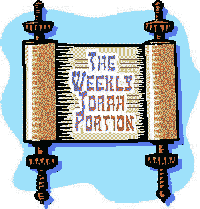Search our Archives:
» Home
» History
» Holidays
» Humor
» Places
» Thought
» Opinion & Society
» Writings
» Customs
» Misc.
|
Spiritual Means
By Michael Chessen
The Mishna, the Oral Law, does not generally deal with Biblical
narrative. Rather, it primarily serves as the means by which we interpret
the Written Law's commandments and practically apply them to our day to day
lives. The "Ethics of the Fathers" fills a rather unique role as a tractate
of the Oral Law which involves itself wholly with advice on acquiring the
proper mindset and outlook towards the pursuit of studious and pious
observance of the Torah. However, like all of the Oral Law, Ethics of the
Fathers is also a means (for gaining insight and understanding of the
Written Law), and in this capacity, it is only natural that it should give
mention to the Biblical narrative which most directly challenges the need
for intermediaries, namely, our current reading of Korach.
Chapter five of Ethics of the Fathers cites the attempt on the part of
Korach and his followers to usurp the authority of Moses and Aaron as the
paradigm of a dispute which is "not for the sake of Heaven", and will
therefore "bear no abiding value". On a superficial level, it might appear
that in demanding equal opportunity to achieve a role in leadership, Korach
was simply espousing modern democratic values. However, the midrash
provides a more penetrating glimpse into Korach's ulterior motives by
linking the episode of Korach's leadership challenge to the conclusion of
our preceding Torah reading of Shelach.
At the end of Shelach we are given the commandment to place a thread
of sky-blue (t'chelit) among the tassels (tzitzioth) which we are to tie to
our garments as a reminder to seek a holy path in life. The midrash says
that Korach asked Moses whether a garment which was made entirely of
sky-blue material still required tassels. In seeking to dispose of the
reason for a commandment which Moses had reported to the Jewish people,
Korach was not only challenging Moses, he was challenging the very validity
of the commandments themselves. Both Moses and the sky-blue thread were
intermediaries, a teacher and a reminder of holiness. If these could be
rendered redundant, then perhaps the commandments themselves were
altogether superfluous. Perhaps an individual could simply be holy in
spirit, without needing to express this fact in any act or deed.
Not only does the Torah reading of Korach prove him to be tragically
wrong, but history has repeatedly proven his philosophy wrong as well.
Ironically, insofar as Korach had attempted to dispose of Moses as an
intermediary, in our following reading of Chukath, Moses perhaps brings
upon himself his terrible punishment of being denied the merit of leading
the Jewish people into the Land of Israel by failing to fully internalize
the ramifications of Korach's errant claim and punishment. In next week's
reading, Moses is instructed to bring water forth from a rock by speaking
to it, and he instead strikes it with his staff, and act which could be
interpreted as a rejection of himself as intermediary. Whatever the exact
cause of Moses' punishment, his death will be nothing like the ignoble
decent which Korach suffers, but one accompanied by praise unequaled in all
of the Torah. This is because Moses was undoubtedly the paradigm of an
individual who acted solely for the sake of Heaven and the Jewish people.
Wishing you all a Shabbat Shalom !

|
|
Please let us know if you see something unsavory on the Google Ads and we will have them removed. Email us with the offensive URL (www.something.com)
|





|
